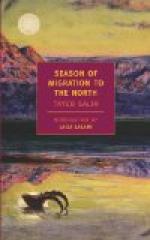How about their families, the camp of waiting ones left behind in the woods? With no one to hunt for them, gaunt Famine held these in her clutch. Grandmothers’ faces grew weary, the sharpened eyes of the little children peered daily across the snow waiting, watching, for the hunters who were to bring food. The fires were made in readiness, but no meat came to those hanging kettles. Old and feeble, young and helpless, alike became weaker as they watched. One by one they died. The survivors ate of the dead bodies. At last, of the nineteen souls, Louise and her sister alone lived. Wild-eyed and starving, holding one old musket between them, these two sisters stumbled off together to try to make Little Red River, leaving behind them in the woods the most awful experience that two human beings could share. At the nightly camps each feared the other and neither dared to sleep. The third night out, thinking that Louise slept, the sister levelled the gun at her stooping companion, but Louise was watching through burnt holes in the canvas. The next day brought no food, and the nightly watch was repeated. Then the sister died. How she died God and the watching stars alone know. Some say that Louise carried with her a piece of her sister’s flesh as food when at last she staggered into Red River. This Louise denies, but admits freely the cannibalism of the winter’s camp.
Cannibalism! As we use this term we regret the paucity of a language which forces us, in describing the extremity of Louise, to use the same word which we apply to those inhuman monsters who, of their own volition, choose the flesh of man for food. It is an awful story. Human imagination and sympathy utterly fail to give a conception of the agony undergone by these poor creatures—women and children with affections like our own—shut for the greater part of a winter within that cruel camp of death!
Coming back to the world of men and women, Louise was for years a recluse, shunned of all Indians as a “Wetigo” or “Cannibal.” A friend was raised up to her in the person of Mrs. Scott, the wife of Archdeacon Scott, who took her in and made her a member of their household. Years passed, and Louise married a man whose Cree name is The-Man-Who-Looks-Like-Silver. To this marriage a little child has been born.
As we arrange the little group for a photograph, the mother tenderly caresses the child and the father smiles kindly upon both. Louise the Cannibal! When we look on our joint picture, it might be somewhat difficult to distinguish the writer from the Indian woman. She is “even as you and me.”
CHAPTER XXIII
LESSER SLAVE LAKE TO EDMONTON
“I hear the tread of Nations yet to be,
The first low wash of waves where soon shall roll
a human sea.”
[Illustration: A Peace River Pioneer]




